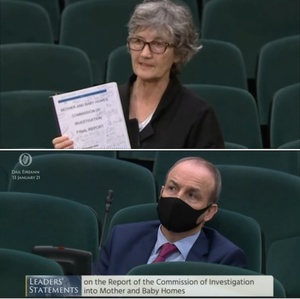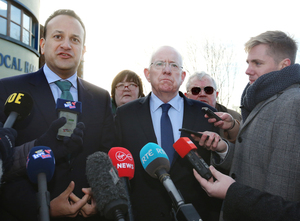 From top: Tanaiste Leo Varadkar; Eamonn Kelly
From top: Tanaiste Leo Varadkar; Eamonn Kelly
Recently the Tánaiste had a pop at basic income. It was during a finger-wagging exercise on the need for Ireland to ratify the controversial CETA trade deal with Canada.
Misrepresenting the situation, as he likes to do, he described Ireland as “laggards”, despite the fact that Ireland is among several EU countries yet to ratify the deal, basically for the same reasons, not least of which is the fact that the deal will allow corporate entities the right to sue the state should the state interfere in any way with profits.
The Tánaiste’s angle about basic income was similar to the one he used recently to suggest that arguing for social housing is arguing against private housing. Here he was suggesting that arguing for a basic income is arguing against trade, as if the two were mutually exclusive.
A few days later he was describing social housing as “free” housing, as if social tenants don’t pay rent.
I’ll tell you what free housing is. It’s when your parents are wealthy enough to buy you the best education on the market, where you can classroom into your 20s, then hand you capital loans for your first house and car, introduce you to their influential circle of friends, guide you into politics as the best option for a lifetime of smugly lording it over the riff-raff, before eventually dying off and leaving you a free house.
Basic Income
It’s the first time I’d heard the Taniaste have a dig at basic income, and it was so out of context that I assumed that the idea is gaining in popularity and he doesn’t like it. Then, a few days later, it was announced that the long-awaited basic income pilot for artists will be given the green light starting in 2022. From this the assumption must be that FF have gone for basic income and FG are annoyed to see “free” money being released on their watch.
The announcement however was a bit dented by the news a day or two earlier that the pandemic payments would be cut in the Autumn. Along with this news came the other news that in practically everyone’s estimation €350 per week is not enough to live on, which I’m sure will interest other welfare recipients and pensioners still struggling along on €203 per week, not to mention the youths who receive less than half this in pocket money.
Tax Free
And all this in the shadow of the news that a Microsoft subsidiary with an address in Ireland paid no corporation tax on profits of €357bn. My understanding of tax breaks for corporations was that it was in return for jobs. But this particular subsidiary doesn’t have employees, just a few directors. It sounds more like some kind of elaborate money-laundering operation.
Still, it was charitable of the government to give them a “free” office here. Otherwise, they’d have been homeless in Bermuda, with only an off-shore bank to hold their hand. Corporations are frail creatures you know. That’s why they need protections, tax breaks and more rights than human beings. Otherwise, they’d just shrivel up, liquidate and get a bail out with bonuses for all their head honchos.
Above the Law
In other news, the authors of the Mother and Baby Homes report were being called to account for selectively editing survivor testimony, even allegedly altering facts to suit the “boss”, in this case the Church. The victims, unlike the Church, were given no right of reply when the report was published and were apparently kept in the dark wherever possible. Sounds familiar. A committee was asked to look into this and the authors refused to cooperate. That’s about as above the law as you can get without moving to Bermuda.
Still, it’s good news that basic income is being given a test run, even if the timing makes it seem a wee bit bribey. The danger of course is that by confining the payment to a select group, arts practitioners, there is a risk of stoking resentment elsewhere.
Ideally a basic income would be universal. That’s the accepted view if there is to be any hope of winding down capitalism, which is the underpinning idea behind basic income, as one of a range of possible ways to manage the climate crisis and somehow stop the corporations from eating up the planet.
However, it’s a good idea to test basic income on the arts community, since the positives are more likely to be immediately apparent given that arts practitioners tend to be self-motivated. This, by the way, is a characteristic of arts practitioners that the employer/employee paradigm absolutely fails to understand.
Good News and Bad Suits
There was more good news last week when a private member’s Bill on enshrining the right to housing in the constitution cleared second stage. This will hopefully lead to a referendum on the right to housing, or the right to “free” housing, as Leo would have it.
Expect lots of dillying, plenty of dallying and endless warnings about meddling with the Constitution, now that there’s a proposed change that might actually benefit non-millionaires.
The week ended on a celebratory note with massed Gardai mingling with massed revellers on Dublin’s streets, proving that there’s nothing like an onrushing line of baton-wielding cops to wreck a party vibe.
Finally, whatever about Edwin Poots’ creationist views, he desperately needs some wardrobe advice. Poots’ suit featured on RTE News as a kind of walking haberdashery tragedy. Best guestimates are that Poots’ suit is probably around 6,000 years old.
Eamonn Kelly is a freelance Writer and Playwright.
Previously: Eamonn Kelly on Broadsheet











